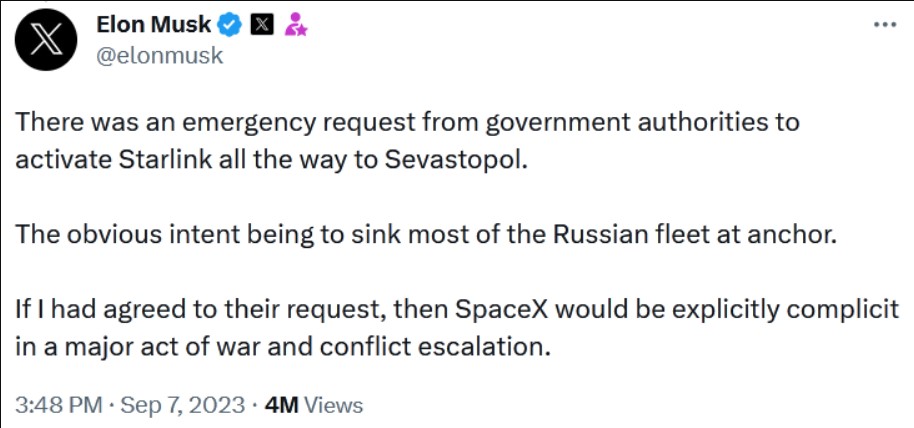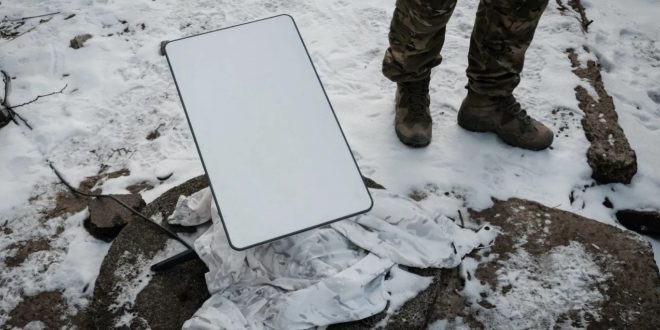Elon Musk said he canceled a Ukrainian military strike on Russia by refusing to use Starlink. The billionaire claims the decision was made to avoid being “complicit in a major act of war,” but it raises serious questions about oligarchs’ military roles.
CNN reported it, citing Walter Isaacson’s upcoming Musk biography. Musk describes a 2022 Ukrainian attack on Russia’s navy off Crimea in the book.
Musk claimed on X/Twitter that Starlink was not active over the region, but the ships and marine drones that would have carried out this attack relied on it. He refused Ukraine’s “emergency request” to activate it, and the drones “lost connectivity and washed ashore harmlessly,” leaving the Russian ships unharmed.
The issue is simple: A government requested a service from a private company that its leader thought was inappropriate and declined. Musk was a mercenary or arms dealer, though less directly involved in violence. (Russia would soon demonstrate a similar principle when the Wagner Group marched on Moscow.)
Another, more troubling interpretation is that an American billionaire unilaterally fought for a foreign ally. This has happened many times before, but Starlink’s rise to prominence due to Musk’s promotion of it for Ukraine’s use after Russia’s invasion is unprecedented.
This article (and this site and your author) cannot address geopolitical mathematics, but it is hard not to wonder if Musk should offer a key service to Ukraine and then withdraw it at will.
Musk justified his decision by saying, “If I had agreed to their request, then SpaceX would be explicitly complicit in a major act of war and conflict escalation.”

This is fair, but like many of the CEO’s statements, it ignores context.
Leaving aside that Starlink had enabled countless military actions, Musk’s claim that this would have been a “mini-Pearl Harbor” is dubious. Ukraine and Russia were already at war after the latter invaded, so comparing a counterattack against an aggressor to the sneak attack that drew the U.S. into World War II is ignorant. Musk’s demands that Russia make concessions to end the conflict make it seem more dishonest.
It is unsustainable for Musk’s personal views on conflict to determine Starlink’s military use. Podolyak, a Ukrainian PM advisor, said on X/Twitter after the story broke:
Sometimes a mistake is much more than just a mistake. By not allowing Ukrainian drones to destroy part of the Russian military (!) fleet via #Starlink interference, @elonmusk allowed this fleet to fire Kalibr missiles at Ukrainian cities. As a result, civilians, children are being killed. This is the price of a cocktail of ignorance and big ego.
Can Musk weigh whether avoiding a Russian attack is worth the inevitable cost in Ukrainian lives? He has put himself in the position of deciding who should live in a war on the other side of the world.
Musk may think he can do this, but he’s overestimated his abilities before. The question is whether he or anyone in a similar civilian or commercial power should be allowed to make the choice.
Former world Chess champion and activist Garry Kasparov summarized:
spacex and starlink are great, but if Musk’s delusional ‘anti-war’ agenda leads him to interfere with their services for Russia, it’s a huge risk.”
The situation Musk faced was unprecedented, but not anymore. Those who are comfortable making life-and-death decisions will likely find ways to avoid a foreign oligarch.
 Tech Gadget Central Latest Tech News and Reviews
Tech Gadget Central Latest Tech News and Reviews




